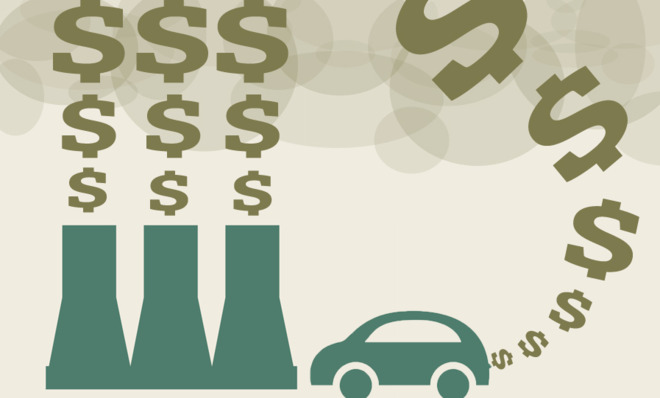Why don't economists get climate change?
It's time to bring pollution analysis right into the center of the discipline


A free daily email with the biggest news stories of the day – and the best features from TheWeek.com
You are now subscribed
Your newsletter sign-up was successful
Mainstream economists typically don't spend a lot of time on problems related to the environment and pollution. The discipline of economics is mostly devoted to basic market analysis: supply and demand, elasticity, monopolies, fiscal and monetary policy, etc.
Yes, there is usually a recognition of external factors that could affect or distort the elegant models economists create. This is a simple patch to standard models that includes the impact of pollution. If you think of pollution as a form of trespassing — in which costs are levied on someone else, otherwise known as an externality — then pollution can be calculated through a Pigouvian tax. The tax is intended to deter such activity (as opposed to its traditional function of collecting revenue).
This works fine in theory, but not so much in practice. Pigouvian taxes — which play a role in the famed cap-and-trade system that died in Congress — are rarely, if ever, applied in the real world. Bureaucratic rules and regulations are instead about the only method of pollution control that can survive the political system.
The Week
Escape your echo chamber. Get the facts behind the news, plus analysis from multiple perspectives.

Sign up for The Week's Free Newsletters
From our morning news briefing to a weekly Good News Newsletter, get the best of The Week delivered directly to your inbox.
From our morning news briefing to a weekly Good News Newsletter, get the best of The Week delivered directly to your inbox.
But climate change is the kind of externality problem that militates towards shaking up the standard economics curriculum and putting pollution near the center. Here's a great piece on "greening" economics over at Voxeu:
The difference between the financial and environmental crisis is that we actually do have a good body of work that incorporates natural capital in models of growth. The problem is that it has remained to a large extent the restricted domain of environmental economists. The vast majority of us were able to get degrees in economics without ever reading a single paper on environmental economics or encountering natural capital as an argument in the production functions we studied. We did hear about Pigouvian taxes of course — and so figured the problem had been solved…
As a result, environmental economists tend not to talk about economic growth per se, but about sustainable economic growth. When macroeconomists refer to sustainable growth, however, they usually mean sustained growth. When growth economists study the role of externalities in the growth process they almost exclusively refer to technological and knowledge externalities, and generally ignore environmental ones, even though the latter are likely to become largely more relevant in the coming decades. [Voxeu]
One can do a perfectly sensible externality-based analysis of climate change. But the sheer size of the problem, as well as the fundamental economic importance of the processes that create carbon pollution (e.g., energy generation, transportation), places it well beyond the scope of traditional environmental problems. It's an externality that has the potential to eat the entire market system as we know it.
Just how big are we talking about? The new IPCC report estimates that ~2 degrees Celsius of warming might cost between 0.2 percent and 2 percent of global income, while emphasizing that it's very difficult to measure such things, and that damages are more likely to be larger rather than smaller than that.
And when it comes to more extreme warming, basically all bets are off. Any research in this area is fairly speculative, but many serious estimates are highly alarming. Several Armaggedon-type situations (collapse of the permafrost methane reserves, for example) could ensue, and we could quite quickly lose control of the situation.
A free daily email with the biggest news stories of the day – and the best features from TheWeek.com
There is practically no limit on the extent of possible economic damage. Given enough warming, market capitalism as we know it could collapse. None of this is certain, of course, but that very uncertainty is itself a reason to hedge our risks and for economics to take climate change more seriously. Heavily carbonized economic growth has to be recognized as a phenomenon that contains the seeds of its own undoing.
One can draw an analogy to physics: Newtonian mechanics work very well at human-scale speeds and sizes. But when it comes to very fast speeds, very small objects, or very massive objects, Newtonian models break down, and we need relativistic or quantum models.
That is the situation that economics finds itself in today. Unconstrained markets are at risk of devouring themselves and nearly everyone else. It's high time the discipline started grappling with that fact.
Ryan Cooper is a national correspondent at TheWeek.com. His work has appeared in the Washington Monthly, The New Republic, and the Washington Post.
